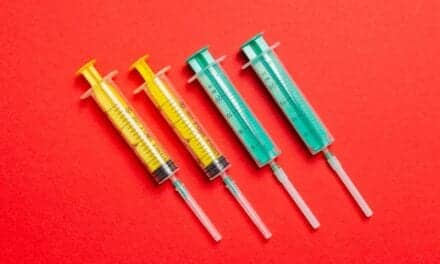
It’s still early, but a Phase 1/2 study showed that RT002 reduced glabellar lines in nearly all of 48 patients. In addition, this benefit lasted almost twice as long as what the literature has shown with conventional botulinum toxin injections, according to Revance Therapeutics Inc. The Phase 1/2 data appear in a special issue of Dermatologic Surgery.
Based on the results of this study and previous, Revance initiated BELMONT, a Phase 2 active comparator study. BELMONT is a double-blind, dose-ranging, active- and placebo-controlled multi-center study. Top-line data from BELMONT is expected in late 2015.
RT002 is Revance’s proprietary, investigational injectable botulinum toxin. It is a pure, 150kD botulinum toxin, type A molecule without any accessory proteins or animal-derived components. RT002 incorporates the patented TransMTS® peptide technology and is designed to provide a longer duration of effect. Revance is also developing topical form of the toxin—RT001—using the same peptide technology. RT001 is currently in a Phase 3 clinical development program in the United States for the treatment of lateral canthal lines.
In the new, open-label, dose-escalating study, all subjects had severe or moderate wrinkles at baseline, measured using the 4-point Global Line Severity Scale (GLSS). Clinical investigators rated 96% of subjects with none or mild wrinkle severity at maximum frown 4 weeks post-treatment using this scale. At the same time point, 83% of the subjects assessed themselves as achieving none or mild wrinkles at maximum frown.
In the final cohort, where duration of effect was measured, RT002 achieved a median duration of 29.4 weeks, or 7 months, based on both investigator and subject assessments. Sixty percent of subjects maintained none or mild wrinkle severity at 6 months, the study showed.
The treatment was safe. There was no evidence of spread beyond the treated area at any dose. Additionally, adverse event rates did not change in frequency, severity, or type with increasing doses.
Based on the results of this study and previous, Revance initiated BELMONT, a Phase 2 active comparator study. BELMONT is a double-blind, dose ranging, active- and placebo-controlled multi-center study. Top-line data is expected in late 2015.
“BELMONT compares injectable RT002 and placebo with the current industry standard and this makes it a unique study,” says Alastair Carruthers, MD, editor of the current special issue of Dermatologic Surgery focused on botulinum toxin. “In 2015, we will know how RT002 compares with BOTOX® Cosmetic and a placebo control, especially with regard to duration of effect and complications. If results are in line with previous data, use of RT002 could extend well beyond aesthetic applications.”


